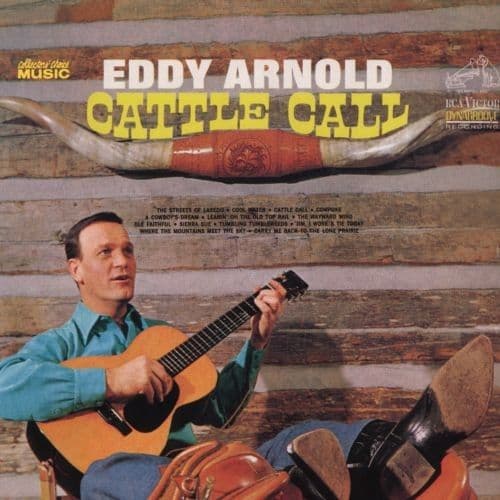
An Enduring Promise of Love and Longing
Let’s journey back to a time when country music spoke with a gentler, more profound voice, when melodies were smooth as silk, and lyrics painted pictures of heartfelt emotions that resonated across generations. In that golden era, few voices commanded the airwaves with such warmth and sincerity as Eddy Arnold. The “Tennessee Plowboy” had a unique ability to bridge the gap between traditional country and more pop-oriented sounds, captivating audiences with his rich baritone and earnest delivery. Today, we turn our attention to one of his most beloved and enduring classics, a song that has cradled countless hearts through the distances of separation: “I’ll Hold You In My Heart (Till I Can Hold You In My Arms).”
This timeless ballad was released in 1947, emerging into a post-World War II landscape where themes of separation, reunion, and enduring love were deeply embedded in the public consciousness. “I’ll Hold You In My Heart (Till I Can Hold You In My Arms)” became an immediate and monumental success for Eddy Arnold. It soared to the top of the charts, spending a remarkable 21 non-consecutive weeks at number one on the Billboard Country & Western Best Sellers chart, a record for the longest-running number one hit in country music history that stood for decades. It also crossed over to the pop charts, reaching number 13 on the Billboard Hot 100, a significant achievement for a country artist of that era. The song was featured on many of his compilation albums throughout his illustrious career, cementing its status as a cornerstone of his discography. Its pervasive popularity at the time speaks volumes about its universal appeal and its ability to touch a nerve with a public yearning for emotional connection.
The genesis of “I’ll Hold You In My Heart (Till I Can Hold You In My Arms)” is a tale of collaborative genius. The song was co-written by Eddy Arnold himself, alongside the talented Thomas Dilbeck and Vaughn Horton. Arnold, known for his hands-on involvement in shaping his music, contributed significantly to the lyrical and melodic structure. The post-war era was ripe for songs that spoke of enduring love despite physical separation, a theme that resonated profoundly with soldiers returning home and families rebuilding their lives. The lyrics were crafted with a simple yet profound elegance, capturing the deep yearning and steadfast loyalty that defined many relationships of the time. It wasn’t about grand gestures, but about the quiet, persistent promise of unwavering affection, a sentiment that Arnold, with his comforting vocal style, was uniquely positioned to deliver.
The meaning of “I’ll Hold You In My Heart (Till I Can Hold You In My Arms)” is beautifully encapsulated in its title: it’s a solemn vow of unwavering devotion and a patient endurance of separation. It speaks to the power of memory and affection to sustain a relationship when distance keeps loved ones apart. The singer promises to keep the image and feeling of their beloved alive within their very being, providing comfort and strength until the day they can be reunited physically. It’s a sentiment filled with hope, trust, and an implicit understanding of commitment. For those of us who have experienced the bittersweet ache of long-distance love, or the quiet fortitude required to wait for someone important, this song becomes an anthem. It perfectly articulates the feeling that love transcends physical proximity, finding its sanctuary in the heart and mind until circumstances allow for a tangible embrace.
Listening to “I’ll Hold You In My Heart (Till I Can Hold You In My Arms)” today, it washes over you with a comforting wave of nostalgia. Eddy Arnold’s smooth delivery, the gentle swell of the strings, and the understated arrangement create an atmosphere of profound sincerity. It transports one back to a simpler time, when heartfelt sentiment was conveyed with directness and genuine emotion. It reminds us of the enduring power of a promise, and the quiet resilience of love that can weather any storm, even that of prolonged absence. This song is more than just a historical hit; it’s a timeless testament to fidelity and the power of the human heart to bridge any divide, a comforting echo of love that continues to resonate with warmth and truth.